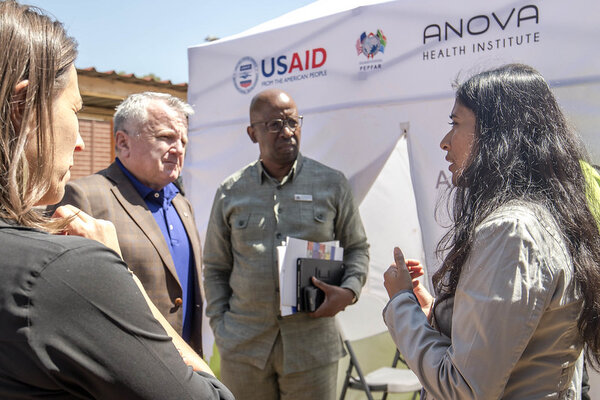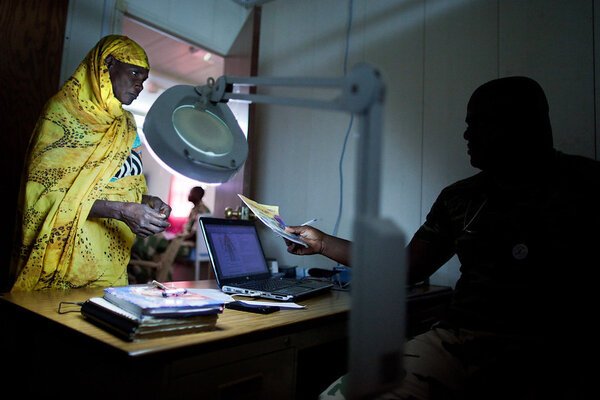Aktuelle Kurznachrichten zu Themen der internationalen Gesundheitszusammenarbeit sowie zu Informationen unserer Mitglieder.

"A new study published today in the International Journal of Health Geographics by researchers from the Swiss Tropical and Public Health Institute (Swiss TPH) and the Kenya Medical Research Institute (KEMRI) reveals how climate change, socio-economic changes such as urbanization and malaria control efforts are influencing the spread of malaria in Kenya. Using geostatistical modelling, the study found that despite a decline in malaria overall, there was a significant rise in malaria risk in some regions. The findings underscore the pressing need for tailored public health strategies that can adapt to the impacts of climate change."

WHS 2024 Wrap-Up
"At the World Health Summit 2024, the largest donor event for the WHO Investment Round so far was hosted, with pledges totaling one billion US dollars made or reaffirmed. “All for Health, Health for All: Signature Event for the WHO Investment Round” was attended by high-level speakers such as Federal Chancellor Olaf Scholz, the Chair of the Gates Foundation, Bill Gates, and Director-General of WHO, Tedros Adhanom Ghebreyesus. During the WHS 2024, more than 50 partner events, side events, announcements, and launches took place, such as the launches of Global Health 2050: The Lancet Commission on Investing in Health 3.0 and of the Inauguration of the WomenX Collective Berlin Hub."

WHS 2024 Wrap-Up
"At the World Health Summit 2024, the largest donor event for the WHO Investment Round so far was hosted, with pledges totaling one billion US dollars made or reaffirmed. “All for Health, Health for All: Signature Event for the WHO Investment Round” was attended by high-level speakers such as Federal Chancellor Olaf Scholz, the Chair of the Gates Foundation, Bill Gates, and Director-General of WHO, Tedros Adhanom Ghebreyesus. During the WHS 2024, more than 50 partner events, side events, announcements, and launches took place, such as the launches of Global Health 2050: The Lancet Commission on Investing in Health 3.0 and of the Inauguration of the WomenX Collective Berlin Hub."

WHS 2024 Wrap-Up
"At the World Health Summit 2024, the largest donor event for the WHO Investment Round so far was hosted, with pledges totaling one billion US dollars made or reaffirmed. “All for Health, Health for All: Signature Event for the WHO Investment Round” was attended by high-level speakers such as Federal Chancellor Olaf Scholz, the Chair of the Gates Foundation, Bill Gates, and Director-General of WHO, Tedros Adhanom Ghebreyesus. During the WHS 2024, more than 50 partner events, side events, announcements, and launches took place, such as the launches of Global Health 2050: The Lancet Commission on Investing in Health 3.0 and of the Inauguration of the WomenX Collective Berlin Hub."

The narrative on universal health coverage should be centred around four core elements: universality, equity, adequate financing, and preparedness in public health emergencies, write Katri Bertram and Justin Koonin
"Universal health coverage means that “all people have access to the full range of quality health services they need, when and where they need them, without financial hardship.” All United Nations member states have committed to make progress towards universal health coverage. Despite two high level meetings on the topic, a persistent gap remains between ambitious commitment and concrete actions. One challenge limiting progress is the fragmented and convoluted way by which advocates make the case for it. Advocates can reduce such confusion and simplify political arguments by focusing on four core elements for what implementing universal health coverage needs to look like in practice."

The narrative on universal health coverage should be centred around four core elements: universality, equity, adequate financing, and preparedness in public health emergencies, write Katri Bertram and Justin Koonin
"Universal health coverage means that “all people have access to the full range of quality health services they need, when and where they need them, without financial hardship.” All United Nations member states have committed to make progress towards universal health coverage. Despite two high level meetings on the topic, a persistent gap remains between ambitious commitment and concrete actions. One challenge limiting progress is the fragmented and convoluted way by which advocates make the case for it. Advocates can reduce such confusion and simplify political arguments by focusing on four core elements for what implementing universal health coverage needs to look like in practice."

The narrative on universal health coverage should be centred around four core elements: universality, equity, adequate financing, and preparedness in public health emergencies, write Katri Bertram and Justin Koonin
"Universal health coverage means that “all people have access to the full range of quality health services they need, when and where they need them, without financial hardship.” All United Nations member states have committed to make progress towards universal health coverage. Despite two high level meetings on the topic, a persistent gap remains between ambitious commitment and concrete actions. One challenge limiting progress is the fragmented and convoluted way by which advocates make the case for it. Advocates can reduce such confusion and simplify political arguments by focusing on four core elements for what implementing universal health coverage needs to look like in practice."

"This report highlights the substantial impact of commercial determinants on noncommunicable diseases (NCDs) in the WHO European Region. Nearly 7500 deaths per day in the Region are attributed to commercial determinants, such as tobacco, alcohol, processed food, fossil fuels and occupational practices. These commercial products and practices contribute to 25% of all deaths in the Region. The report’s chapters systematically explore various facets of how commercial interests exacerbate NCDs and key strategies used by commercial actors to negatively influence NCD-related policies at the national and international level. The report also provides selected case studies from the Region to illustrate key strategies and outcomes of industry influence on health policies. The report then calls for urgent and coordinated action to address the commercial determinants of NCDs."

"This report highlights the substantial impact of commercial determinants on noncommunicable diseases (NCDs) in the WHO European Region. Nearly 7500 deaths per day in the Region are attributed to commercial determinants, such as tobacco, alcohol, processed food, fossil fuels and occupational practices. These commercial products and practices contribute to 25% of all deaths in the Region. The report’s chapters systematically explore various facets of how commercial interests exacerbate NCDs and key strategies used by commercial actors to negatively influence NCD-related policies at the national and international level. The report also provides selected case studies from the Region to illustrate key strategies and outcomes of industry influence on health policies. The report then calls for urgent and coordinated action to address the commercial determinants of NCDs."

"This report highlights the substantial impact of commercial determinants on noncommunicable diseases (NCDs) in the WHO European Region. Nearly 7500 deaths per day in the Region are attributed to commercial determinants, such as tobacco, alcohol, processed food, fossil fuels and occupational practices. These commercial products and practices contribute to 25% of all deaths in the Region. The report’s chapters systematically explore various facets of how commercial interests exacerbate NCDs and key strategies used by commercial actors to negatively influence NCD-related policies at the national and international level. The report also provides selected case studies from the Region to illustrate key strategies and outcomes of industry influence on health policies. The report then calls for urgent and coordinated action to address the commercial determinants of NCDs."

"In addition to pursuing the goal of universal health coverage, primary health care (PHC) helps to ensure health system resilience and health security. Community engagement plays a vital role in PHC leading to increased trust and safeguarding vulnerable groups against health threats. It is also critical for reducing inequalities, a key weakness when facing health threats. The comprehensive approach and expanded roles in multi-disciplinary teams within PHC strengthen the capacity to address community needs and enhance resilience. Greater integration of PHC and public health, as observed in some settings during the COVID-19 pandemic, can lead to better outcomes. PHC played a crucial role during the pandemic and can protect against future health shocks."

"In addition to pursuing the goal of universal health coverage, primary health care (PHC) helps to ensure health system resilience and health security. Community engagement plays a vital role in PHC leading to increased trust and safeguarding vulnerable groups against health threats. It is also critical for reducing inequalities, a key weakness when facing health threats. The comprehensive approach and expanded roles in multi-disciplinary teams within PHC strengthen the capacity to address community needs and enhance resilience. Greater integration of PHC and public health, as observed in some settings during the COVID-19 pandemic, can lead to better outcomes. PHC played a crucial role during the pandemic and can protect against future health shocks."

"In addition to pursuing the goal of universal health coverage, primary health care (PHC) helps to ensure health system resilience and health security. Community engagement plays a vital role in PHC leading to increased trust and safeguarding vulnerable groups against health threats. It is also critical for reducing inequalities, a key weakness when facing health threats. The comprehensive approach and expanded roles in multi-disciplinary teams within PHC strengthen the capacity to address community needs and enhance resilience. Greater integration of PHC and public health, as observed in some settings during the COVID-19 pandemic, can lead to better outcomes. PHC played a crucial role during the pandemic and can protect against future health shocks."

"The health community recognizes the climate crisis as an existential threat to humanity and human health, requiring immediate and effective action across all sectors. However, global-level policy guidance reveals a disconnect between primary health care and climate; most political declarations, reports and resolutions for primary health care make only cursory references to the climate crisis, mentioning its implications for health but not linking them. Given that primary health care should be the entry point for the population’s interaction with the health system, it is alarming that ongoing efforts to revitalize primary health care fail to adequately consider climate action, both in terms of mitigation and adaptation. In this paper, we examine this disconnect, elaborate on its implications and offer recommendations for policy-makers to ensure an effective primary health care–climate crisis nexus."

"The health community recognizes the climate crisis as an existential threat to humanity and human health, requiring immediate and effective action across all sectors. However, global-level policy guidance reveals a disconnect between primary health care and climate; most political declarations, reports and resolutions for primary health care make only cursory references to the climate crisis, mentioning its implications for health but not linking them. Given that primary health care should be the entry point for the population’s interaction with the health system, it is alarming that ongoing efforts to revitalize primary health care fail to adequately consider climate action, both in terms of mitigation and adaptation. In this paper, we examine this disconnect, elaborate on its implications and offer recommendations for policy-makers to ensure an effective primary health care–climate crisis nexus."